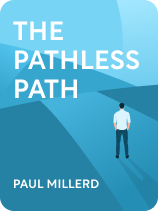

This article is an excerpt from the Shortform book guide to "The Pathless Path" by Paul Millerd. Shortform has the world's best summaries and analyses of books you should be reading.
Like this article? Sign up for a free trial here.
Do you work for yourself and find it hard to stay motivated? What untapped sources of motivation are out there waiting for you?
With a traditional job, it’s easy to know whether you’re on the right track—either you’re performing well and achieving traditional benchmarks, or you’re not. When you’re self-employed, it’s a little more complicated.
Continue reading to learn three sources of freelancer motivation you should tap into.
Freelancer Motivation
Freelancer motivation can be a tricky proposition. Insecurity about whether you’re doing the right thing can diminish your will to keep going. To minimize your insecurities and stay motivated as a freelancer, Millerd recommends making the following adjustments.
#1: Define What You Wish to Avoid
When your ultimate goal is unclear, define what you don’t want to happen. Then, figure out what steps to avoid taking so that it doesn’t occur. If you find that you’re on the path to making that bad outcome happen, you need to make changes. If not, you’re probably doing OK. To illustrate, suppose your worst fear is becoming destitute. If your current work situation isn’t paying your bills or is causing you to go into outrageous debt, you probably need to revise your approach to work.
(Shortform note: Psychologists distinguish between avoidance goals like Millerd describes, where you’re focused on avoiding a poor outcome, and approach goals, where you’re focused on pursuing a positive outcome. Some experts say that avoidance goals are typically less motivating than approach goals—and research suggests that pursuing more avoidance goals than approach goals can lead to poorer self-esteem, increased procrastination, and decreased satisfaction with both your goal-related progress and your life in general. For that reason, they suggest transforming avoidance goals into approach goals when possible—for example, instead of trying to avoid destitution, you might aim to build an emergency fund.)
Millerd says that change is inevitable—work opportunities will come and go, your financial situation will vary, and you may even revise your values and definition of success. Instead of resisting change, prepare yourself to go with the flow and have faith that even though you don’t know exactly what’s going to happen, it’s going to be OK.
#2: Stay Adaptable
(Shortform note: In Who Moved My Cheese?, Spencer Johnson offers some tips for adapting to work-related changes. These include staying abreast of signs of change so that you can better prepare for it, accepting that the prior state of things no longer applies, and focusing on the potential benefits of the change instead of the things that scare you about it.)
#3: Connect With Supporters & Mentors
Supporters are those who believe in your ability to live a meaningful life outside of traditional parameters, and mentors are those who can teach you how to do that because they’re already doing it themselves. Millerd notes that social media is a great avenue to find supporters and mentors—people who openly share their life stories online can learn from each other, and you may even be able to find an online community created for people in situations like yours.
(Shortform note: In Never Eat Alone, entrepreneur Keith Ferrazzi says there are two methods to connect with supporters and mentors online. The first method is approaching prospective supporters and mentors directly—you can decide who you’re interested in networking with, follow and message them, and eventually try to meet in person. The second method involves posting interesting content to your social media that will compel prospective supporters and mentors to reach out to you instead.)

———End of Preview———
Like what you just read? Read the rest of the world's best book summary and analysis of Paul Millerd's "The Pathless Path" at Shortform.
Here's what you'll find in our full The Pathless Path summary:
- How to take a non-traditional approach to career success through freelancing
- Why Americans prioritize work and the disadvantages of this lifestyle
- One man's inspiring story of shifting from the workforce to freelancing






